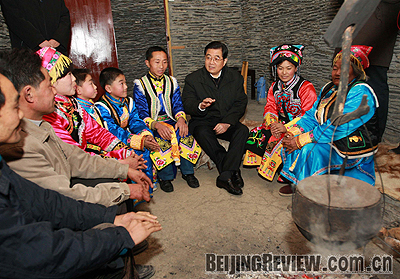|
|

WARM TALKS Chinese President Hu Jintao talks to Qiang ethnic villagers in Mianyang City, southwest China’s Sichuan Province, on December 27, 2008. Hu inspected the reconstruction work in the quake-hit Sichuan Province as well as the livelihoods of the local people on December 27-29, 2008 | Groundbreaking Law
China's top legislature made public a draft law on social insurance, the first of its kind in the country, on December 28, 2008.
It specifies a common right for citizens, urban and rural alike, to pay premiums and enjoy social insurance for medical care, work injuries, unemployment and childbirth.
The draft highlights more efficient fund management. It says that governments at municipal, provincial and state levels should encourage and support the public's participation in supervising insurance funds. It also stipulates that any individual or organization has a right to complain or report illegalities.
The law allows Chinese citizens to pay pension premium in one place and draw money in another if they migrate to other cities or provinces. This stipulation is particularly significant as the country has a much more mobile population than in the past.
The draft also determines that a new rural medical system, in which farmers and governments raise funds together, would be included in the medical insurance plan.
Yangtze Tunnel
China's first tunnel beneath the Yangtze River opened to traffic on December 28, 2008, in Wuhan, capital of central China's Hubei Province.
It is 3.63-km long and has four lanes. Travel time between the city's major areas-Wuchang, where government offices and universities are based, and Hankou, the business center-is now 7 minutes. It used to take half an hour.
Around 50,000 vehicles can travel through the tunnel going 50 km per hour every day. It can withstand flooding and earthquakes measuring up to 6 on the Richter scale, according to Yin Weizhen, Vice Mayor of Wuhan.
The 2.05-billion-yuan ($299.6-million) project began in November 2004. It was part of the city's efforts to improve the transportation infrastructure and relieve congested roads.
Block the River
The Jinsha River in southwest China was blocked on December 28, 2008, to make way for construction of a new hydropower project on the upper reaches of the Yangtze River.
At a cost of 43.4 billion yuan (about $6.3 billion), the Xiangjiaba Hydropower Project is expected to be completed by 2015. It will be able to generate 30.7 billion kw of electricity a year.
"Electricity generated by hydropower stations will mainly be sold to China's eastern, southern and central regions," said Li Yongan, General Manager of the China Yangtze River Three Gorges Project Development Corp. "Sichuan and Yunnan provinces will also benefit from it."
In addition to providing power, the project will play a role in flood control and farmland irrigation.
About 125,100 people from three counties in Yunnan Province and three counties in Sichuan Province have been resettled to make way for the project. | 